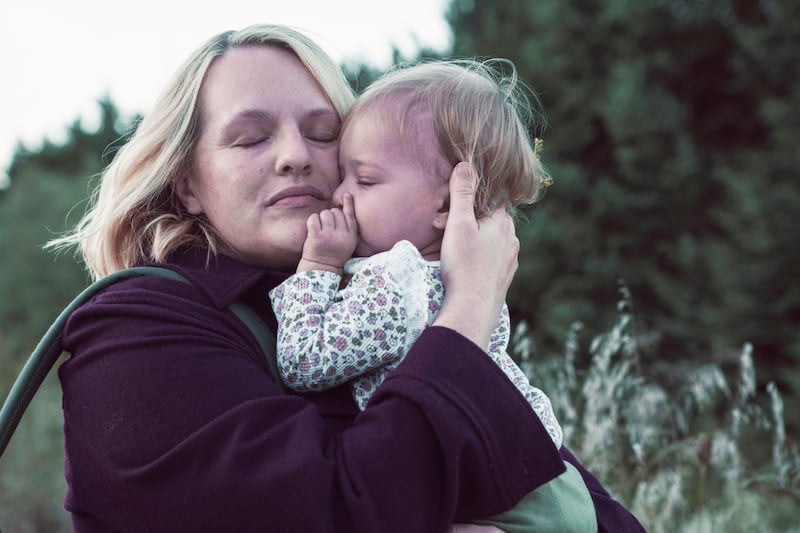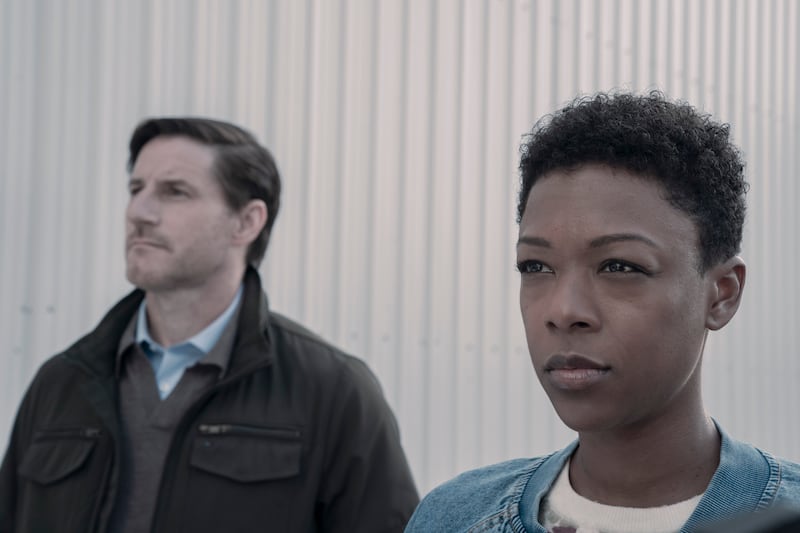The Handmaid’s Tale is the best show you’re afraid of watching.
That’s a pity, because it’s brilliant. Yet that’s also a completely understandable reaction.
The series is set in the near future, when women have no rights, not over our bodies, our minds, or where we live and how. It dramatizes every violent crime and crushing inequality committed against women. Sure, it’s fiction, but it’s also terrifyingly real.
So, for those of us in a constant state of fury and anxiety as we face life under a repressive regime, skipping the show may feel like we’re protecting whatever shreds of mental health remain. Do we need to be even more upset? It’s far more comforting to lose ourselves in a rom-com than dive into this darkness.
But to avoid this series, which will have notched 66 episodes by its May 27 finale, is to miss out on some of television’s best writing, directing, and acting. Yes, it’s a painful drama about the total subjugation of women. But that’s why we should watch, especially as it nears its end.
No spoilers here; why ruin it for anyone? Besides, I signed an NDA when I visited the Handmaid’s set in a suburb of Toronto.
There, on a cavernous soundstage, a well-oiled machine was hard at work on the final episodes. Almost everyone there has been with the series from the beginning nine years ago. (The pandemic and the strikes delayed production.) There’s a sense of community, which the cast and crew are having a hard time relinquishing.
The Hulu series returns on April 8 for its sixth and last season, and proves again why it has won 15 Emmy Awards. Except now, The Handmaid’s Tale hits closer to home than ever. When the show premiered, President Donald Trump was only three months into his first term. The war on women still seemed remote, somehow fictional.
Now, women are arrested after miscarrying.
As I write this, the ACLU just won a case in federal court, preventing Alabama from prosecuting people who help women cross state lines as they seek abortions. That is what counts as a win now. Had the case gone the other way, we would have been one step closer to living in The Republic of Gilead.
In Gilead, new life is vaunted above all else–certainly above the mother’s life. Facing a population crisis, the government has turned fertile, healthy women into breeding slaves. They are passed from rich household to rich household, where the master of the house ceremonially rapes them. His wife helps by holding down the handmaid.
All of this is in Margaret Atwood's 1985 international bestseller. Atwood has famously said that she didn’t invent the violence visited upon women. No, she turned to history. It contained all the horror needed.

Atwood’s sequel, The Testaments, is already in production, helmed by Bruce Miller, the creator, executive producer, and showrunner for the first five seasons of The Handmaid’s Tale.
“Margaret was very encouraging for me and for us to be as creative as we wanted to be,” Miller tells me. “She, in fact, when we came to the project, was more of an expert at having it adapted than I was certainly at adapting books. It had been an opera, it had been a ballet, it was a play, it was a movie. And so she was very comfortable with me changing things. And instead of changing anything, I just wanted to dig. I didn’t want to add anything. I just wanted to dig out what was there because it was such a short book, and I really loved it.”
Still, the writers invented storylines, expanded upon Atwood’s theocratic Republic of Gilead, and fleshed out relationships.
Eight of this season’s 10 episodes were available for screening, albeit with embargoes placed on plots. There’s no joy in spoiling and no reason. What’s important to know is that those who have followed this since Elisabeth Moss’ June was violently snatched away from her husband and daughter should be pleased with how the series concludes. Although the two-part finale was not shared, everything leading up to it is logical and fitting.
Each episode is packed with scenes where you need to admire the artists. There’s no way to put Moss (Mad Men) on a screen opposite Yvonne Strahovski (Teacup) and have it be anything less than compelling.
The two have been perfect foils, with Strahovski as Serena Joy, an imperious, entitled wife who participates in the abuse and rape of June, then called Offred. (Handmaids are known by their master’s name; since they were property, the prefix “of” shows who they belonged to.)
Serena has been a true believer in the rules of Gilead. By this season, though, doubt dances on her sharp edges; compassion seeps through her smugness. She realizes she’s lacking essential connection, friendship. And as the cliffhanger for Season 5 showed, she deluded herself into thinking June is one. We last saw the leads on a crowded train leaving Toronto, and that’s where we first see them now.
Although June, the handmaid of the title, is a born leader, all she ever wanted to be was ordinary. She was ordinary in the time just before this is set. She was simply a working mom with a limited appetite for bulls--t. But Gilead is pretty much built on bulls--t. And so this ordinary woman became the bada-- leader every movement needs.
And that may well be the story’s most important message: We are all potential leaders.

Besides Serena and June squaring off this season and action unfolding in New Bethlehem—a kinder, gentler version of Gilead which sounds like a fuzzier and sweeter version of Hell—there is the indomitable force of Aunt Lydia. Ann Dowd’s character should never be dismissed. No one is better when enraged, and she often is, especially when her authority is challenged. During this season, the armor of her piety begins to show cracks.
Atwood’s sequel, The Testaments, is in production and helmed by Miller. Dowd is in that, too, continuing to plumb the depths of this character. Her Aunt Lydia could easily be seen as a sadist, beating “the girls” under her charge. She teaches them to be submissive and inculcates in them what an honor it is to do God’s work, becoming pregnant.
Dowd, though, sees more there.
“I’ve always loved her,” Dowd says of Lydia. “And the rule, of course, with acting–I think probably the rule in life, period–is no judgment. So, when I was getting to know her, I did not see her as evil and cruel. I saw her as someone who thought, ‘These girls need to be united with God. They don’t have a relationship. Their lives are askew. I’ve got to do this. This is for their own good.’ I think her love of the girls was real, her belief in God is real. Plus, can I say, playing her is a blast.”
Dowd explains what she drew from to find the soul of this woman who can eviscerate someone with a harsh stare.
“I was in school with nuns for 10 years,” Dowd says. “They were not cruel, but they were firm. There’s no question. I mean, the number of times they said to me, ‘Your job is to do what?’ And if my job that week was just to sweep, they would take me right by the hand. ‘What’s that? Has the job been completed? No, it has not. We don’t leave the room until the job is completed.’ And I’m grateful for that message.”
Like many actors, especially those who have lived in a character’s skin for a long time, Dowd finds the good in Aunt Lydia.

“She’s taught me a lot,” Dowd says. “She’s taught me not to be afraid of my own weaknesses and to look keenly at the things about myself that I need to change, and this is coming about strongly now as the seasons progress. Look in the mirror and be honest. Don’t put yourself first. You know, you’re not special. You’re on a television show, and boy, are you fortunate to be on this show. Humility and gratitude are things that I think Lydia believes in very firmly. They are lessons that she has reminded me of and also, listen. Listen. Don’t necessarily be the one talking. Listen and see what you learn.”
In this case, also watch. Full confession: I am one of those who made myself watch The Handmaid’s Tale because I cover TV. Still, I shied from it. It was never less than platinum TV, but it was depressing. Now, it is shockingly, agonizingly current. I’m embarrassed to admit that I hadn’t read it.
I finally bought the book the morning after Election Day, when what I really wanted was a morning-after pill for those results. Then I dove into the series, rewatching it from the beginning. After reading the novel and watching the new season, I agree with my friends. It is too real, too depressing, too timely. And, too good to skip.









